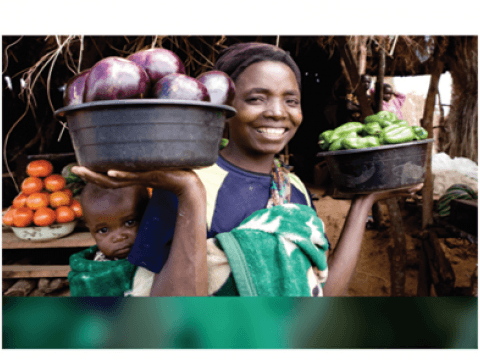Emergency livelihood support to improve food security for 126,000 vulnerable people

In response to the on-going food crisis in South Sudan, World Vision, with the support of Food and Agriculture Organization and in partnership with the Ministry of Agriculture and Forestry is implementing an emergency livelihood support project to improve food security for 126,000 vulnerable people in Greater Warrap and Jubek States.
The project, targeting 21,000 households in the two states aims at contributing towards protecting vulnerable populations affected by the hunger crisis, malnutrition and destitution and will support them to improve food production by providing them the skills, vegetable and crop seeds, fishing kits as well as tools for improved production.
The vegetable kit consists of an assortment of vegetable seeds ie, okra, amaranth, tomatoes, onions, watermelon, kale, and eggplant, the crop kit comprises of cowpea and sorghum seeds while the fishing kit has different types of fishing equipment.
In addition to the seeds and fishing kits, beneficiaries receive training on best agronomic practices to increase production, postharvest handling to minimise loss and value addition such as the extraction of fish oil.
The project is integrated into other ongoing World Vision projects such as the Canadian funded Fortifying Equality and Economic Diversification (FEED), nutrition and food assistance cash transfer projects funded by World Food Programme as well as other partners.
Yesterday, the Jubek State Minister for Agriculture, Hon Rose Lisok Paulino, Jubek Deputy Governor Francis Lotiyu Michael, World Vision National Director Perry Mansfield, FAO’s Officer-in-Charge, Jaqueline Were and other dignitaries witnessed the distribution of the vegetable, crop and fishing kits to 510 farmers in Gumbo County.Distribution has been going on in various targeted areas namely, Northern Bari, Rajaf West, Rajaf East and Gondokoro in Jubek as well as in Kuajok and Wau in the Greater Warrap State.
This phase of the project, dubbed the main season project, will take advantage of the ongoing rains to improve food production for close to 126,000 beneficiaries. Earlier before the rains, a similar project called the Dry Season Vegetable Farming project was implemented and farmers received vegetable seeds as well as fishing kits and encouraged to utilize existing water bodies such as the Nile River to grow vegetables and fish.
Using the best practice skills imparted during various training through Farmer Field Schools, the beneficiaries can use the seeds and fishing kits to produce cereals to last their families for 10 months, and vegetables and fish throughout the year and use the surplus to generate income.